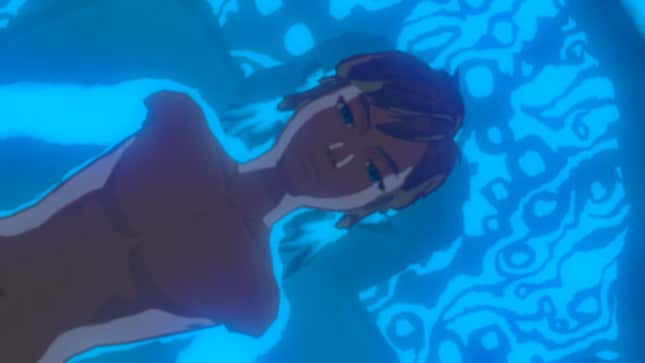
A whole lot of video games begin with your character waking up. It’s one of those things that you can’t stop noticing once you start. Most Zelda games start this way, as well as any number of classic role-playing games like Chrono Trigger. The awakening scene in The Elder Scrolls V: Skyrim is a popular meme. Modern games do it too; Outer Wilds starts out with your character waking up, and that’s also how every one of its in-game time loops begins. That’s not a bad thing. In fact it might be one of my favorite ways to start a video game.
One reason I like is is that it’s an inversion of how waking up works in real life. It signals the end of a dream; when a malleable subconscious world where anything weird, frightening or wonderful can happen comes to an end. But in video games? It’s the opposite. I didn’t know how The Legend of Zelda: Breath of the Wild was going to unfold for me the first time I played it, but I did know that Link and I were starting at the same place: sharply coming to consciousness of our surroundings, unaware of what lay ahead but fairly certain that we could expect anything. A stunning view, unexplained ruins, an incredible, intimidating electric dragon snaking its way through the air, indifferent to me and everything else. Again, most other Zelda games do this as well, with Link’s Awakening including an even more clear analogy between playing a game and having a dream.
I’m not someone who puts a lot of stock in dreams. I don’t tend to remember them; they’re usually just hazy flashes of something bizarre, unsettling, or aspirational. I also don’t think many games are particularly dreamlike. They’re often bound to the trappings of genre, full of conventions that make up the lingua franca of game design.
Seeing all these characters wake up in games makes me realize that I want games to surprise me in similar ways to dreams, to stump and confound me and leave me unsure of how I feel. Again: Most times, they don’t. Most times, they unfold the way things do when I wake up in real life: Pretty mundane, often annoying, with the occasional absurd plot twist.
Sometimes that mundanity is the point, even within the world of the game. Some games use the waking up sequence to teach you about their worlds and rules, with the natural dissonance of sliding into a fictional character’s life being a good opportunity to tutorialize you. It’s not as common to see in other media, but sometimes it’s used to powerful effect.
The FX TV show Atlanta begins most episodes in its first season with its protagonist, Earn, waking up in very different circumstances. While the audience is eventually made aware of where he is, the show never really bothers to impart how he ended up there—nor does it explain any number of surreal events, like people who leave a nightclub in an invisible car. The result is a feeling of displacement, of always feeling a little out of your depth.
Sometimes I wish games would give me something like that, something less concrete. Like an invisible car pulling out of a nightclub.
But maybe it doesn’t really matter whether games resemble my waking or dreaming life more. Maybe I just need them to provide the same sort of cumulative hope that opening my eyes every morning represents. The idea that, if I do it enough times, maybe it’ll all add up to something worthwhile. And that if I fail this time, maybe I’ll get to do it again.